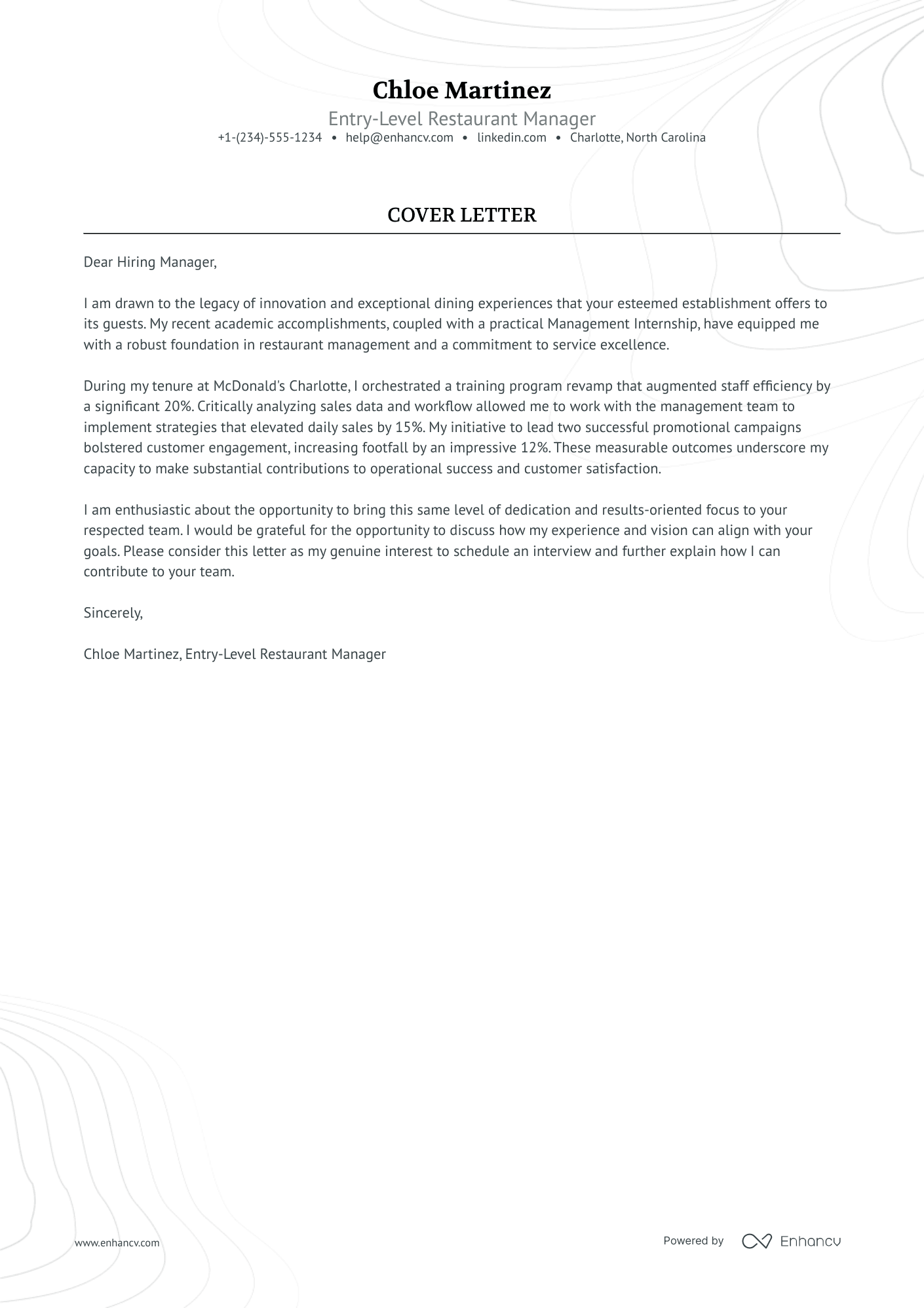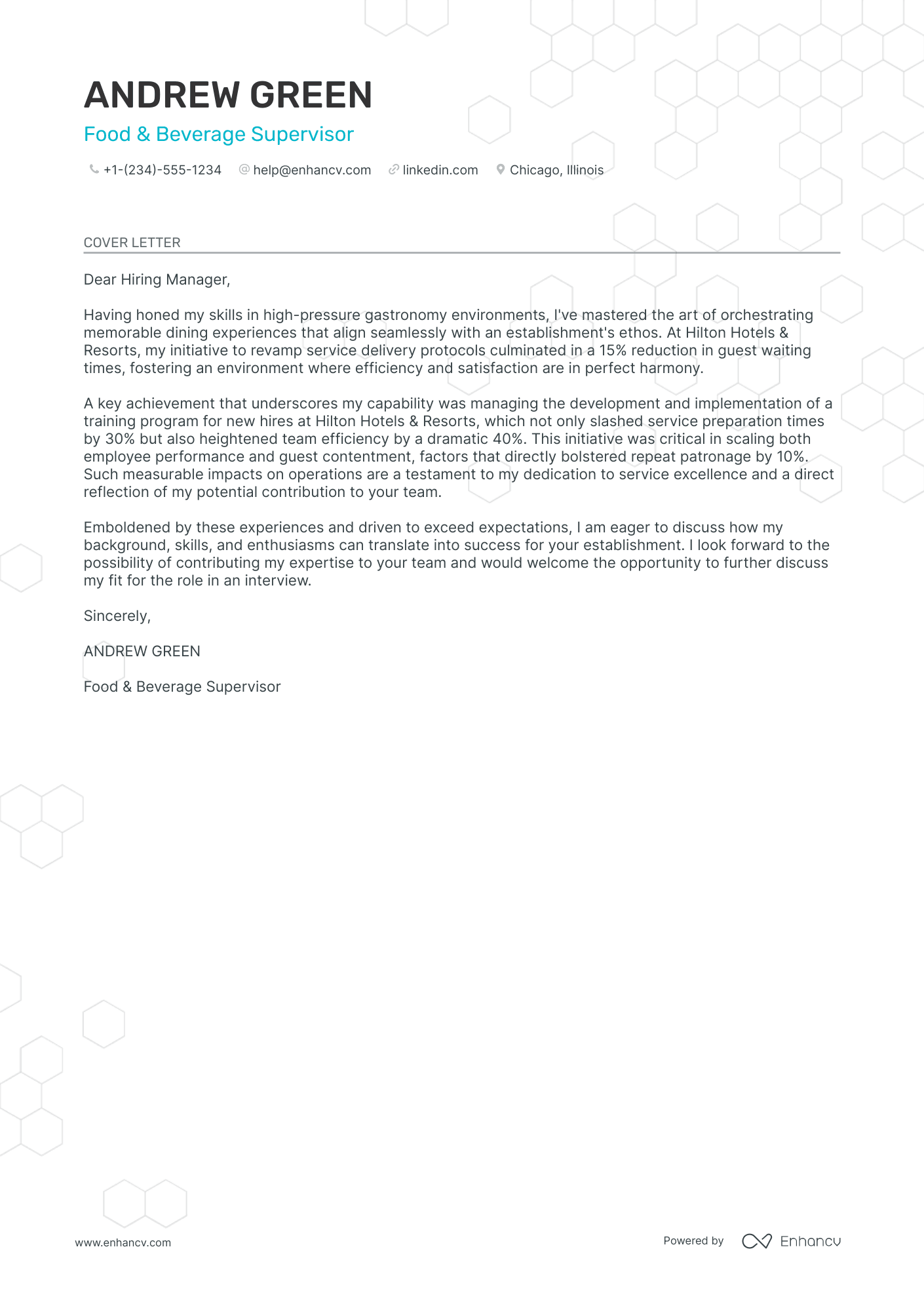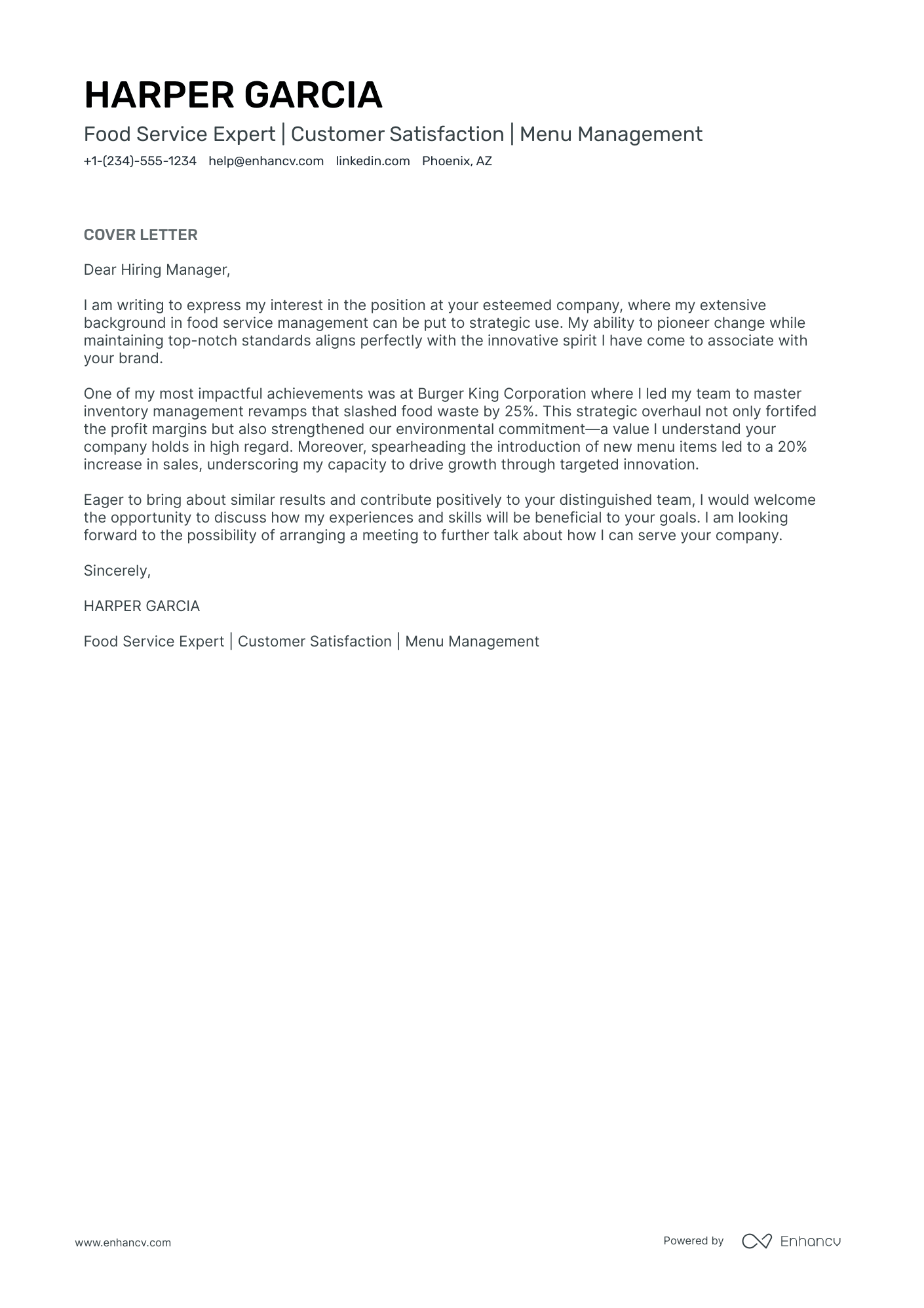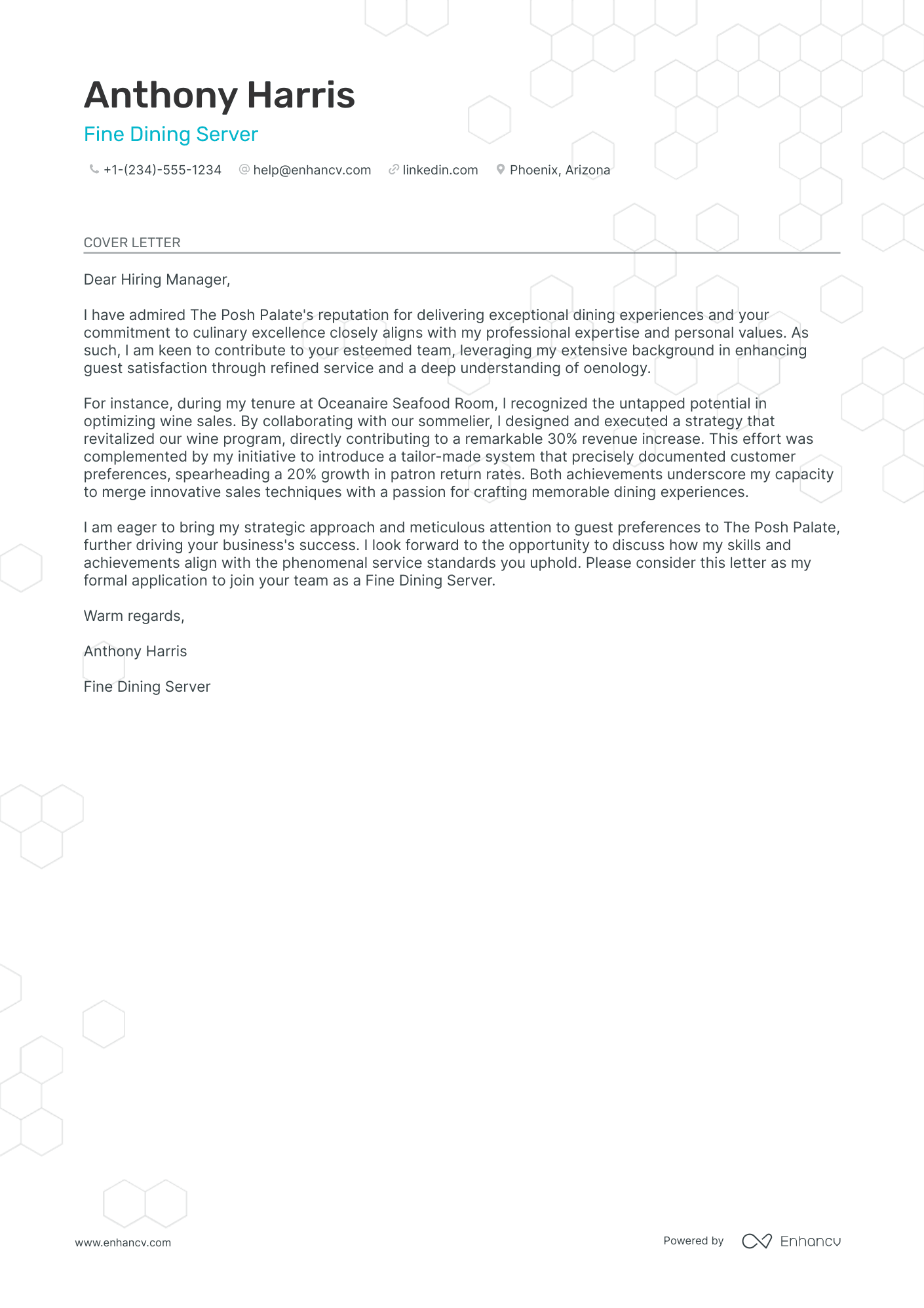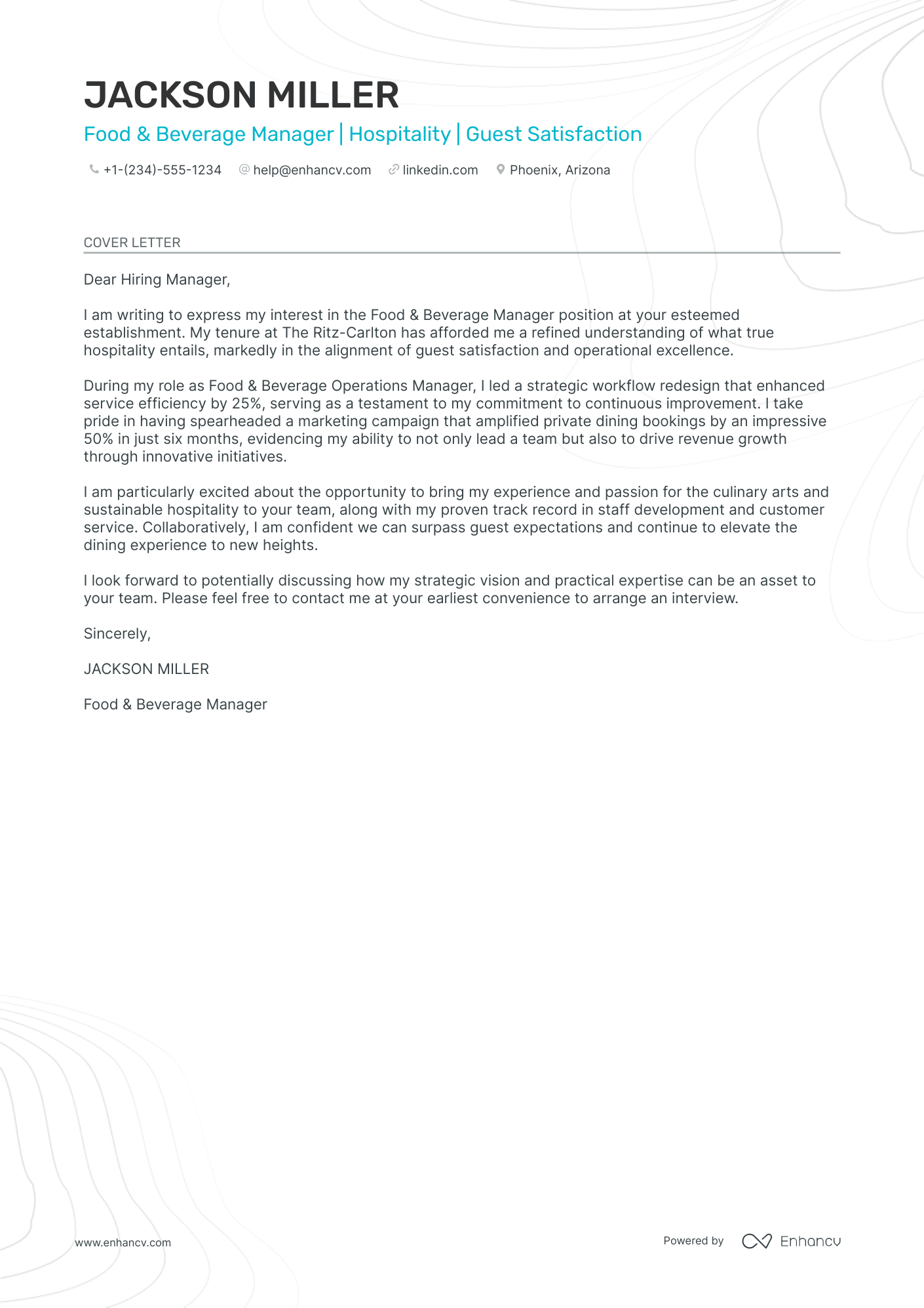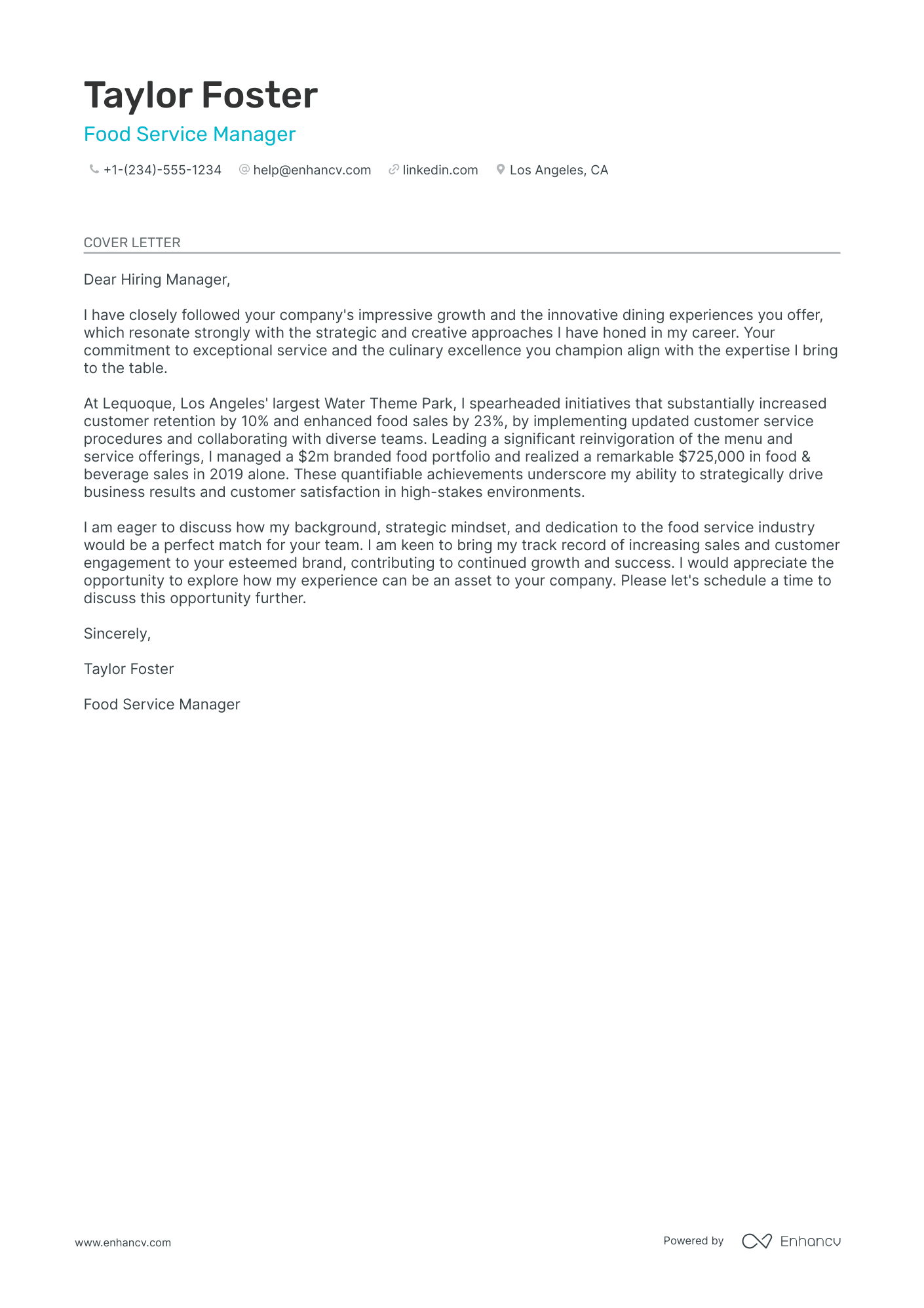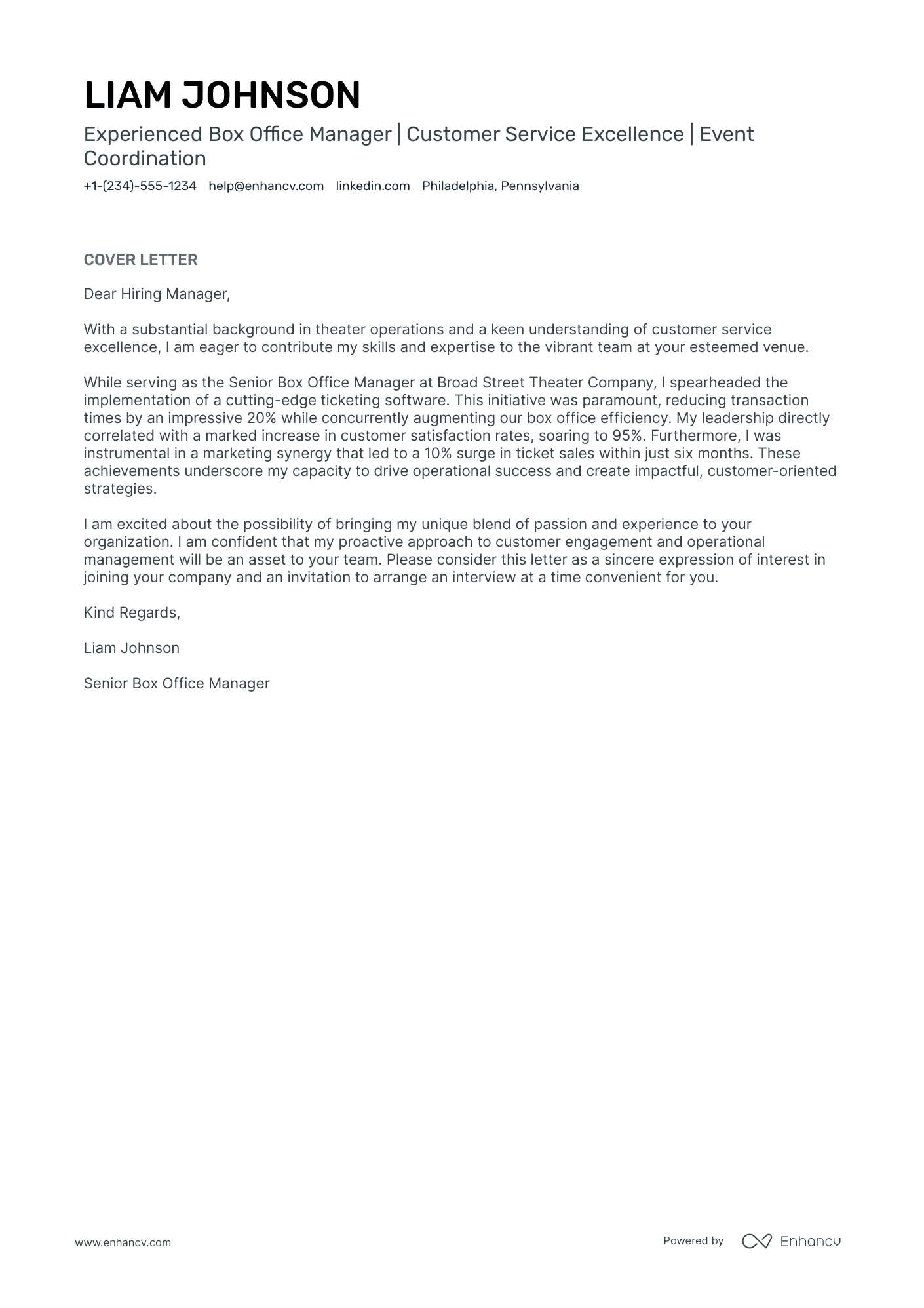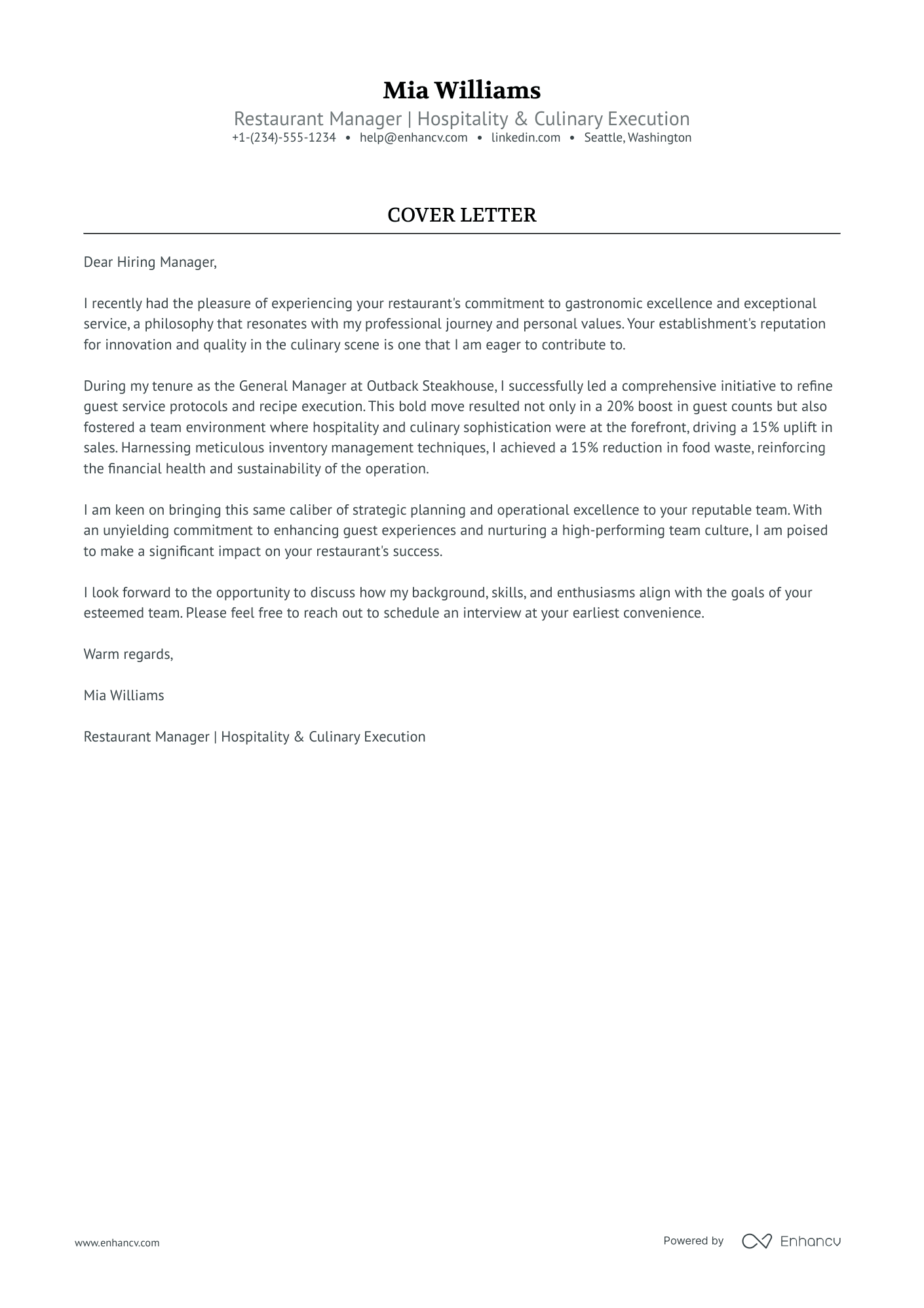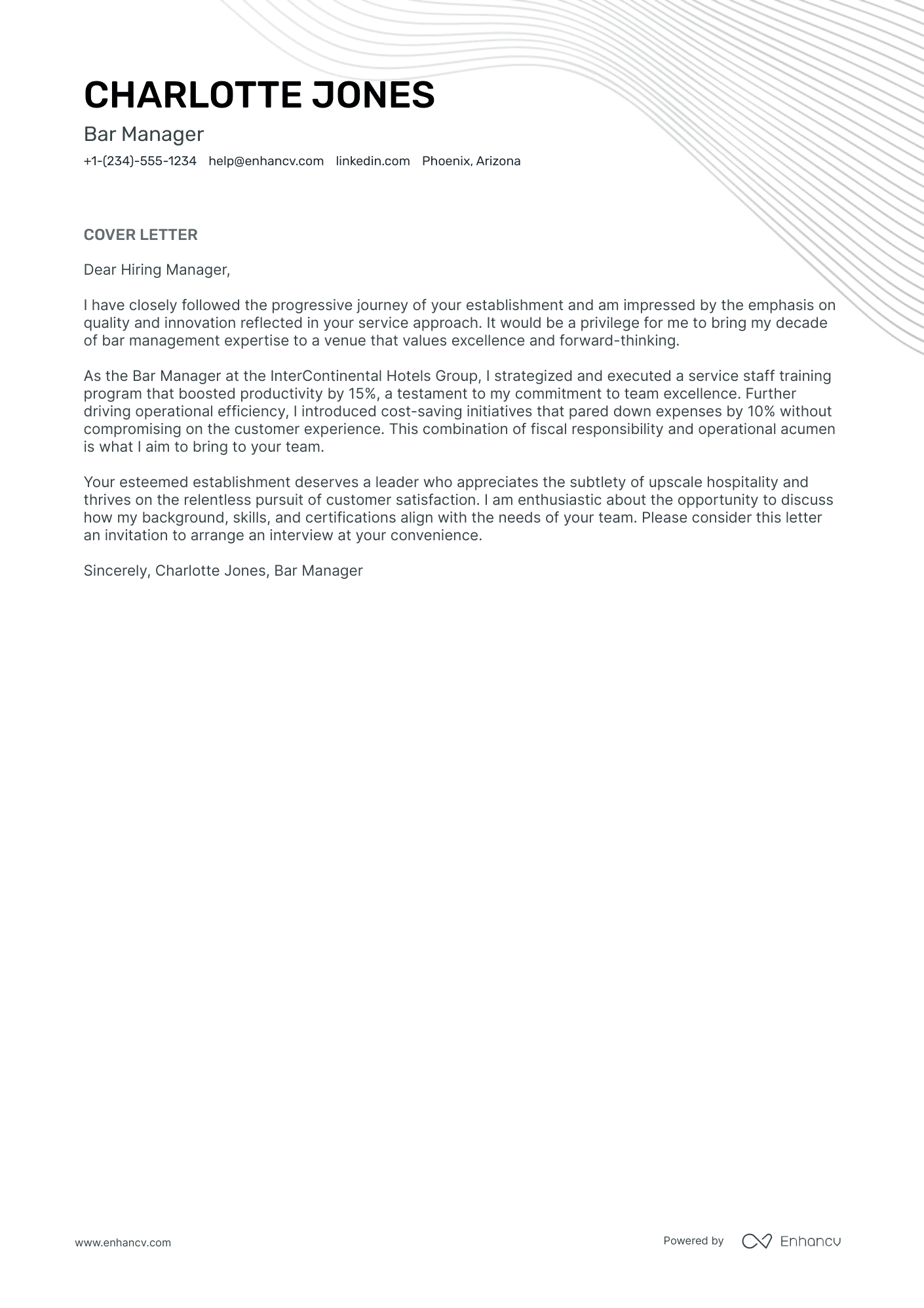Crafting a restaurant manager cover letter can be a daunting task, especially when you're deep into the job hunt and realize it's a requirement, not an afterthought. You might be tempted to rehash your resume, but your cover letter should be a spotlight on your proudest professional moment, woven into a compelling narrative. Keep it concise and engage the reader with your unique story, steering clear of overused phrases. Remember, punchy and professional wins the page.
- Write a restaurant manager cover letter that helps you stand out (and get the job);
- Understand how to start and end your restaurant manager cover letter with the appropriate greeting;
- What to include in the body of your restaurant manager cover letter to put your best foot forward;
- Your most important achievements - how to present them as part of your restaurant manager cover letter.
And if you want to make your life even easier, simply drag and drop your restaurant manager resume into Enhancv's AI cover letter generator, and it will write your cover letter for you in just a few moments.
If the restaurant manager isn't exactly the one you're looking for we have a plethora of cover letter examples for jobs like this one:
Drop your resume here or choose a file.
PDF & DOCX only. Max 2MB file size.
Restaurant manager cover letter example
Amelia Miller
Charlotte, North Carolina
+1-(234)-555-1234
help@enhancv.com
- Emphasize relevant experience that aligns with the company's values – The cover letter mentions a commitment to quality and sustainability, which matches the ethos of The Gourmet Kitchen, making the applicant's experience especially pertinent.
- Quantify achievements to demonstrate impact – Citing a specific 15% increase in average ticket size showcases the candidate's ability to make a concrete, positive impact on the business, which is persuasive to hiring managers.
- Align personal skills with operational needs – The applicant discusses a strategic approach to operations, tying personal capabilities directly to the requirements of the Kitchen Manager role, demonstrating foresight and alignment with managerial responsibilities.
The format of your restaurant manager cover letter: structure, fonts, margins, and more
Your restaurant manager cover letter should include a header (with your name, position, and date); a greeting and introductory paragraph; a body and closing paragraphs; and an optional signature.
Remember that you're writing your restaurant manager cover letter for recruiters - as the Applicant Tracker System won't scan this content.
Here are a few more tips and tricks to keep in mind when formatting your restaurant manager cover letter:
- Use the same font in your restaurant manager cover letter and resume. We recommend modern fonts, e.g. Lato and Rubik, to help you stand out, instead of the stereotypical Arial and Times New Roman.
- Each paragraph should have single spacing, which is already set up for you in our cover letter templates.
- Our cover letter builder follows industry standards for your restaurant manager cover letter formatting - with a one-inch margin, surrounding your content.
- Always export your restaurant manager cover letter in PDF to ensure the image or text quality stays the same and your writing isn't moved about.
Tight on time? Our free cover letter generator helps you create a cover letter instantly from your resume.
The top sections on a restaurant manager cover letter
Header: Include your name, address, phone number, and email to make it easy for the recruiter to contact you, as well as the date and the employer's details to personalize the cover letter for the specific restaurant and manager.
Greeting: Use a professional salutation that addresses the hiring manager by name if possible; this shows you've done research on the restaurant and adds a personal touch.
Introduction: State your interest in the restaurant manager position and briefly mention your most relevant experience or a unique trait that makes you an exceptional candidate, capturing the recruiter's attention and encouraging them to read on.
Professional Experience and Skills: Detail your relevant past management experience, specific accomplishments in the hospitality industry, and skills in staff oversight, inventory management, and customer service, which are crucial for a restaurant manager role.
Closing and Call to Action: End the cover letter by expressing your enthusiasm for the opportunity to contribute to the success of their restaurant, and proactively suggest a meeting or interview to discuss your qualifications further.
Key qualities recruiters search for in a candidate’s cover letter
- Proven leadership and team management skills: Essential for overseeing restaurant staff and maintaining a positive work environment.
- Experience in hospitality and customer service: Critical for ensuring guest satisfaction and handling customer-related issues professionally.
- Budgeting and cost management expertise: Important for controlling expenses, optimizing profitability, and effective resource allocation.
- Deep understanding of health and safety regulations: Vital for maintaining compliance and ensuring a safe dining experience for customers.
- Strong communication and interpersonal abilities: Necessary for effectively coordinating with staff, vendors, and upper management.
- Flexibility and problem-solving aptitude: Required to adapt to the fast-paced nature of the restaurant industry and address unexpected challenges swiftly.
How to address hiring managers in your restaurant manager cover letter greeting
Goodbye, "Dear Sir/Madam" or "To whom it may concern!"
The salutation of your restaurant manager cover letter is how you kick off your professional communication with the hiring managers.
And you want it to start off a bit more personalized and tailored, to catch the recruiters' attention.
Take the time to find out who's recruiting for the role (via LinkedIn or the company page).
If you have previously chatted or emailed the hiring managers, address them on a first or last name basis.
The alternative is a "Dear HR team" or "Dear Hiring Manger", but remember that a "Dear Ms. Simmons" or "Dear Simon," could get you farther ahead than an impersonal greeting.
List of salutations you can use
- Dear Hiring Manager,
- Dear [Restaurant Name] Team,
- Dear [Hiring Manager's Name],
- Dear [Title of the Hiring Authority] [Last Name],
- Dear Members of the [Department or Committee Name],
- Dear [Department] Department,
How to start your restaurant manager cover letter introduction
The opening paragraph of your restaurant manager cover letter can seem like a real enigma.
Where do you start writing?
In your restaurant manager cover letter introduction, focus on yourself by stating what:
- gets you motivated and excited about the role;
- you like best about the company, from culture to awards.
Write no more than two sentences, which are both authentic and show your enthusiasm for the opportunity.
What comes next: your restaurant manager cover letter middle paragraphs
In the next three to six paragraphs (or the body of your restaurant manager cover letter) you have to prove your unique value.
Most candidates tend to mess up at this stage. They tend to just copy-paste information from their resume.
That's one big no-no.
Remember that when writing your restaurant manager cover letter, it has to be personalized. And, your ultimate aim is to catch the recruiter's eye.
So, look back on key job requirements and write down a list that includes the ones you cover.
Next, select just one key achievement from your professional (or personal) history that meets those advert keywords.
Narrate a story around how you've grown your skill set and knowledge. Also, aim to show the unique understanding or soft skills you bring about, thanks to your past success.
Two ideas on how to end the final paragraph of your restaurant manager cover letter
Closing your restaurant manager cover letter, you want to leave a memorable impression on recruiters, that you're a responsible professional.
End your cover letter with how you envision your growth, as part of the company. Make realistic promises on what you plan to achieve, potentially, in the next six months to a year.
Before your signature, you could also signal hiring managers that you're available for the next steps. Or, a follow-up call, during which you could further clarify your experience or professional value.
No experience restaurant manager cover letter: making the most out of your profile
Candidates who happen to have no professional experience use their restaurant manager cover letter to stand out.
Instead of focusing on a professional achievement, aim to quantify all the relevant, transferrable skills from your life experience.
Once again, the best practice to do so would be to select an accomplishment - from your whole career history.
Another option would be to plan out your career goals and objectives: how do you see yourself growing, as a professional, in the next five years, thanks to this opportunity?
Be precise and concise about your dreams, and align them with the company vision.
Key takeaways
Winning at your job application game starts with a clear and concise restaurant manager cover letter that:
- Has single-spaced paragraphs, is wrapped in a one-inch margin, and uses the same font as the restaurant manager resume;
- Is personalized to the recruiter (using their name in the greeting) and the role (focusing on your one key achievement that answers job requirements);
- Includes an introduction that helps you stand out and show what value you'd bring to the company;
- Substitutes your lack of experience with an outside-of-work success, that has taught you valuable skills;
- Ends with a call for follow-up or hints at how you'd improve the organization, team, or role.
Restaurant Manager cover letter examples
By Experience
Entry-Level Restaurant Manager
By Role
